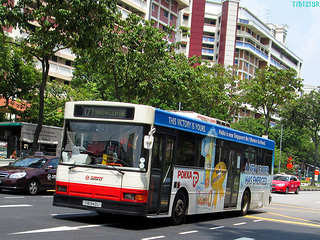Last Monday, November 26, 2012, about 171 Chinese bus drivers from SMRT – a major public transport provider in Singapore – went on strike to protest the salary discrepancy between Chinese and Malaysian bus drivers working for the company. Malaysian drivers are paid S$1,400 a month with a month's bonus, Chinese drivers are paid S$1,075 a month without bonus for the first two years. Other complaints included the change from a five-day to six-day work week and poor living conditions.
Negotiations took place with SMRT management Monday afternoon, and the drivers agreed to return to work the next day. However, 88 workers continued the strike on Tuesday, saying that Monday's agreement of a $25 monthly increase was not enough.The strike was denounced by Acting Minister of Manpower Tan Chuan Jin as “illegal”, a statement that was backed up by the National Trades Union Congress (NTUC), who added, “It is important to send a clear signal to all workers that as a nation ruled by law, there are proper ways of dealing with issues and disagreement.”
Until the Ministry of Manpower had labelled it a strike, the mainstream media had refused to use the word in their coverage, prompting Twitter users to find other euphemisms:
@mrbrown: Alternative names for a Singapore
#busstrike : Co-ordinated Smoke Break
This highlights the decreasing influence of the unions: in this day and age of the internet, if the union is perceived to be pro-employer, the workers always have the option of strengthening their bargaining position by banding together and approaching the press.
NTUC has increasingly started turning to snazzy marketing to increase it’s membership base and the list of benefits of membership include, according to it’s website: “Health & Living, Lifestyle & Entertainment, Retail Therapy, Services & Development, Wine & Dine”.
Strangely enough, for a congress of unions aiming to represent the interest of workers, “Participation in a platform to fight for pay and working conditions” is not one of the benefits of membership.
Joshua Chiang disagrees with the mainstream portrayal of the strikers as holding the public hostage by denying “essential services”:
So here we have a situation where a previously-government-owned-but-now-private enterprise providing a NATIONAL-LEVEL essential service engaging vast numbers of foreign workers (thanks to our very liberal immigration policies), who are nonetheless lacking in representation (thanks to our labor laws) who have to go on strike to make their grievances known (and let's face it, it works) and therefore causing incovenience to commuters.
And they have the nerve to single the workers out as hostage-takers.
Ravi Philemon argues that the strike shows that Singapore cannot depend on foreign workers:
The strike by SMRT's PRC drivers tells us that we cannot be overly reliant on foreigners for our essential services. We have to attract more Singaporean drivers to drive our buses, and for that they must be offered a competitive salary, and their working hours has got to be structured in such a way that they too can enjoy work-life balance.
Aresha expresses her disappointment with fellow Singaporeans for condemning the strikers:
I was really proud at first of being Singaporean when I saw this. It was wonderful to see temporary workers come together against all odds to stand up for a cause they all believed in…
…until I saw words like ‘PRC‘, ‘China‘, ‘ah tiong‘ ‘no respect for the law‘, ‘fine them‘ and ‘send them back‘ ‘being said – entirely missing the point of the very valid cause that the workers were trying stand up to, while unintentionally breaking the law by not serving the 14 day pre-strike notice.
I felt embarrassed about being a Singaporean seeing the way most Singaporeans reacted on newsfeeds and comments… which made me realise that the recent survey by Gallup that found Singapore to be the most emotionless society probably wasn’t that far off from the truth. Emotionless of course to causes that ‘aren’t their business‘.
The cause was very worthy. It was a massive deal.







